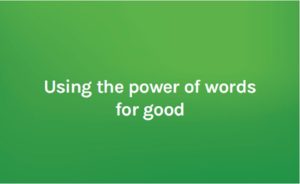The post The Write kind of helping hand appeared first on Plain English Awards.
]]>Like all great things, the Plain English Awards only exist because of the combined vision and ongoing commitment of a group of valuable supporters.
Many hands make light work
At the beginning of our 14-year history, it took a group of passionate professionals, led by Write Limited founder and CEO Lynda Harris, to develop the idea of the Awards and get them started.
Over the course of our history, we’ve relied on various supporters to help us maintain our momentum and keep us working towards our goals. Some have joined us for short periods of time; others have been with us from the start. Check out this year’s sponsors.
Write Limited is one of those long-standing supporters. New Zealand’s premier plain language consultancy, Write is also our founding sponsor. Write believes in using the power of words for good, so sponsoring the Awards fits perfectly with that purpose.
Find out more about why Write chooses to support the Plain English Awards every year

Discover the benefits of sponsorship
Curious about the benefits that sponsoring the Plain English Awards brings to your organisation? Please get in touch — we’d love to discuss sponsorship options with you.
Contact Awards project manager Melissa Mebus on [email protected], or call 04 384 6447 if you’d like to sponsor the Awards.
The post The Write kind of helping hand appeared first on Plain English Awards.
]]>The post What we love about the People’s Choice Awards appeared first on Plain English Awards.
]]>If you’ve been marking off the days on your calendar, you’ll know the time has come. Nominations for the 2019 People’s Choice Awards opened last Saturday.
Success worth being proud of
What we love about the People’s Choice Awards, and what many of you have told us you love too, is how our winners react to their success. Winners of our People’s Choice Best category are invariably enormously proud — and rightly so! Who wouldn’t be? Your work will have been singled out by a member of the public, judged against other outstanding entries, and deemed by the international judging panel to be the best!
Recognition to take in good humour
What about the winner of our award for the worst communication? Our Worst Brainstrain category recognises a document or website that a member of the public has found confusing, frustrating, obscure, or downright horrible. With all the potential fallout from winning this unenviable title, we love that our winners invariably accept their ‘success’ in good humour. And they see it as an opportunity to start over again, so that their communication serves its audience better.
Check out the acceptance speeches by some past winners of the People’s Choice Worst Brainstrain award:
The post What we love about the People’s Choice Awards appeared first on Plain English Awards.
]]>The post Three reasons to get involved in the 2019 People’s Choice Awards appeared first on Plain English Awards.
]]>You’re in for a plain English treat over the next couple of years. This year we’re pushing the People’s Choice Awards to the fore (we’ll be back with the full Awards next year). So right now, in 2019, we’re giving all of you in the public domain the chance to nominate your most and least favourite communications.
Here are three great reasons to get involved this year.
You want to do something about frustratingly confusing communications
When you nominate a communication for the not-so-coveted Brainstrain award, you’ll be helping to make a positive difference to the way organisations communicate. Almost without exception, organisations step up to ‘take it on the chin’ when nominated for the dreaded bin of sour worm lollies. With the public scrutiny they get from winning the Brainstrain category, they’re motivated to change.
You want to share a wonderful example of clear communication with the world
We love to celebrate the great work happening in so many organisations that are improving the way they communicate. Winning the award for Best Plain English Communication is a public pat on the back for New Zealand’s clearest communicators. Help them get the recognition they deserve.
You want to help improve the lives of everyday Kiwis
The People’s Choice Awards help organisations to keep things real with their communications. If they win the Best Plain English Communication award, they’re recognised for getting things right for their audience. If, however, they win the dreaded Brainstrain award, they have plenty of incentive to change for the good.
Don’t muck about. It’s time to send your nominations for this year’s People’s Choice Awards!
The post Three reasons to get involved in the 2019 People’s Choice Awards appeared first on Plain English Awards.
]]>The post Plain English is alive and kicking in New Zealand appeared first on Plain English Awards.
]]>What an amazing ceremony last night! Congratulations to all our 2018 winners — you deserved all the recognition you got. The feedback you each received from your judges truly shows that plain English is alive and kicking in New Zealand. It also shows that, as a Trust, we’re making great strides towards fulfilling our goals.
‘Keep going and spread the word!’
A special mention to the winners of our Plain English Champion — Best Individual or Team category. The work that’s gone into the Better Letters Project at the Ministry of Social Development is seriously changing the lives of everyday New Zealanders.
Our judges got it right when they said, ‘Keep going and spread the word! Imagine what New Zealand’s public service might look like if every government department took this approach!’
Find out about this year’s winners
Take a look at photographer Rebecca McMillan’s wonderful photos of the ceremony
The post Plain English is alive and kicking in New Zealand appeared first on Plain English Awards.
]]>The post Congratulations to our 2018 finalists appeared first on Plain English Awards.
]]>Our judges have announced this year’s finalists. Find out who they are here
What makes an entry good enough to become a finalist? According to our judges, it’s all about being like this:
- ‘Overall, we have a strong example of how a company can take complex information and share the details both with clarity and with compelling storytelling. Kudos!’
- ‘I would certainly use this product as an example of effective plain writing and information design.’
- ‘This is an exemplary document.’
Now the countdown begins to our Awards ceremony on Thursday, 15 November, where we’ll announce and celebrate this year’s winners. Watch this space for details about how to get tickets.
The post Congratulations to our 2018 finalists appeared first on Plain English Awards.
]]>The post Outstanding entries deserve outstanding judges appeared first on Plain English Awards.
]]>Meet our incredible line-up of plain English experts — from around New Zealand and the world — who’ll be judging entries in this year’s Awards. We’re proud to have such a wonderful pool of experts, and honoured that they’ve all offered their time to help us decide on our finalists and winners. We’re also grateful for the feedback they’ll give to all shortlisted entrants.
Judges for the 2018 Plain English Awards
The post Outstanding entries deserve outstanding judges appeared first on Plain English Awards.
]]>The post For the good of the people — enter the People’s Choice awards appeared first on Plain English Awards.
]]>Members of the public can praise a paragon of clarity or put forward a perplexing paper in the People’s Choice category of the Plain English Awards.
You can enter documents and websites for two awards:
- Best Plain English Communication — for the most outstanding example of a plain English document or webpage nominated by a member of the public
- Worst ‘Brainstrain’ Communication — for a publicly available or widely used document or website that causes problems for many people.
How a Brainstrain award can help
The Brainstrain typically gets a lot of publicity. But even the winners of this category can turn the event into something positive. By shining a spotlight on entries in this category, awards organisers hope the entries will be rewritten in beautifully plain English.
Winners are welcome to blow their own trumpet
The winners of the Best Plain English Communication can share news of their win. They receive a logo to display on the winning publication and their email footer. They’ll also often have people blowing their trumpet for them — take a look at what stuff.co.nz had to say about last year’s winner, the Wellington City Council.
Entries come from everywhere
People nominate documents from likely and unlikely places.
The Wellington City Council’s newsletter Our Wellington Tō Tātou Pōneke won the ‘best’ award in 2017. Judges said vibrant design and friendly language made the document appealing. ‘Successfully combines drier council initiatives with more exciting information on events.’
In 2016, a paper from researchers NZIER with the forbidding title ISDS and Sovereignty won. It succinctly explained a key point of contention in the Trans-Pacific Partnership. It was ‘a breath of fresh air to readers used to struggling through lengthy, jargon-filled advisory documents,’ said the judges.
KiwiSaver documents have won both the ‘Best’ and ‘Brainstrain’ awards.
How you can enter
You have until 3 September to enter a website or document. You need to submit an electronic copy of the entry — so if you’re entering a printed document, you’ll need to scan it.
Entries must:
- be whole documents or webpages, not extracts
- be in current use for business purposes
- be owned by an organisation that operates in New Zealand
- not be owned by the organisation you work for
- not be a book, or an extract from a book.
Your identity will not be revealed to the organisations you nominate, or to the judges.
Enter the People’s Choice — Best Plain English Communication
Enter the People’s Choice — Worst ‘Brainstrain’ Communication
The post For the good of the people — enter the People’s Choice awards appeared first on Plain English Awards.
]]>The post Recognising the best of the plain English best appeared first on Plain English Awards.
]]>What’s the best feedback you could hope for about a website that you or your organisation has created? What’s the greatest outcome you could imagine from a document your organisation has published? And what’s the most satisfying result you could wish for for the writers in your organisation?
How about, ‘This site was our clear and unanimous winner! We hope plain-writing professionals and trainers will use it as a good example of plain writing principles’? Or what about, ‘What’s not to like?’ And even, ‘It’s hard to see how the writers could have helped the readers more’?
The responses we’ve listed above are all true-blue pieces of feedback from judges at last year’s Plain English Awards. What kind of feedback do you think you’d get?
Going the extra mile for readers
Every year the Plain English Awards honours those individuals and organisations who have gone the extra mile to get the best outcomes for their readers. The Awards are a public pat on the back for plain English champions. They help to raise the bar for clear communication.
To decide on our champions, independent panels of plain English experts and advocates judge entries and decide on who’s best in each category. This year the Awards has 13 different categories to enter (or to be entered in).
Are you ready to be in the running?
Entries for the 2018 Plain English Awards are open. You have 3 months to get your entries in before they close on Friday, 31 August.
Enter the 2018 Plain English Awards through our website.
The post Recognising the best of the plain English best appeared first on Plain English Awards.
]]>The post Our judges have announced their shortlists! appeared first on Plain English Awards.
]]>We’ve had plenty of positive and productive feedback about this year’s entries, with several judges commenting on how tough their decision-making has been. One judge summed up the dilemma perfectly: ‘This competition is stiff, and we will have to do some real work to sort out the best of the best.’
Take a look at this year’s shortlists
Entries on the shortlists are in no particular order. If we haven’t published a shortlist, it means we can’t let the cat out of the bag just yet. In some categories we had fewer entries that met the judges’ high standard.
Look out for the list of finalists on 19 October.
The post Our judges have announced their shortlists! appeared first on Plain English Awards.
]]>The post Improving the quality and usefulness of writing appeared first on Plain English Awards.
]]>Why do we hold the annual Plain English Awards? What is it exactly that we’re trying to achieve?
Celebrating individuals and organisations that put the needs of their readers first
Everyone’s talking about it — busy people leading busy lives. Everyday people are regularly expected to read what can be critical information in a variety of mediums. But if the information they’re getting is written or presented in a way that makes it difficult to process, essential messages can get lost or muddled.
The Plain English Awards celebrate individuals and organisations that put the needs of their readers first. The Awards aim to:
- improve government and business documents so that all New Zealanders can understand them
- raise public awareness of the need for, and benefits of, plain English
- create a public preference for organisations that choose to communicate in plain English.
How seemingly small changes can make a big difference
Last year Wellington author and writing trainer Simon Hertnon was a judge in the People’s Choice section of the Plain English Awards. He and his panel members chose the winner of the Best People’s Choice — Best Plain English Communication and the People’s Choice — Worst ‘Brainstrain’ Communication.
Simon shared his impression of the two winning entries in his recent blog post about the critical influence of tone in a formal document. Suitable tone is a key component of any plain English document. And last year’s winner of the Best Plain English Communication Award offered a perfect example of how effective good tone can be. The winner of the Brainstrain Award, however, illustrated the alternative.
‘One winning entry illustrated why the default writing style of business and government — which I would characterise as formal, exhaustive, and impersonal — regularly fails to meet the needs of today’s information-overloaded reader,’ Simon says in his blog post.
‘The other winning entry provided an exemplar for what business and government writers can and should do to improve the quality and usefulness of their writing. That is, to employ a familiar, confident, no-nonsense tone.’
Time to get your entries in for the 2017 Awards
Have you submitted your Awards entries yet? Don’t miss out — enter now
The post Improving the quality and usefulness of writing appeared first on Plain English Awards.
]]>
